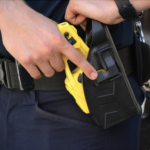Man Awarded $400k for Police Brutality

Eathan Cruse has been awarded $400,000 after police entered his parents’ home, tied his hands behind his back with cable ties and bashed him repeatedly before slamming him into a fridge.
As usual, taxpayers will ultimately foot the bill – not the offending officers.
The case
Mr Cruse was just 19 years old when counter-terrorism police in Melbourne performed a dawn raid on his parents’ home in April 2015. It was one of six raids conducted by police the same morning as part of investigation into a reported plot to kill police and civilians on Anzac Day.
Mr Cruse originally filed his complaint with the State’s police complaints system, the Professional Standards Commission and also reported the incident to the Aboriginal Legal Services. The case ended up in the Supreme Court with Mr Cruse suing the State of Victoria over the alleged use of excessive force during the raid.
Wrongful arrest
Mr Cruse testified in court that he was restrained by police while lying on the floor of the hallway. He was hit by officers on the side of the head, then moved to the kitchen where he was thrown against the fridge, pushed to the floor and struck several times on the head, neck and upper body. While he was lying on the floor, Mr Cruse said police told him there was “more to come”.
The account was supported by his father, who said he could not see everything happening in the kitchen from where he was held by police but could hear it: “I know what a beating sounds like,” he testified.
After beating Mr Cruse, police arrested him. But later released him without charge.
Investigations led to the eventual arrest of five teenagers in relation to the plot. 18-year old Sevdet Besim was convicted some months later to 10 years behind bars for preparing and planning a terrorist act.
Police gave ‘false denials’ to Victorian Government
After a three-day hearing, Supreme Court Judge Melinda Richards found that police had wrongfully arrested Mr Cruse, and did not have reasonable grounds to suspect him of involvement in a crime in the first place.
Her Honour made clear that police had given “false denials” which were accepted by the Victorian government in its decision to fight Mr Cruse’s claim for damages.
The Victorian Government has not acknowledged what occurred or expressed regret or contrition for the conduct of its police officers, which has cause the victim major depression and post-traumatic stress disorder.
She described Mr Cruse’s arrest as a “cowardly and brutal attack” and a “shocking departure from the standards set for police officers by parliament and expected of them by the community”.
Abuse of power
In awarding damages, Ms Richards also said that the amount was “not sufficient to bring home to the state of Victoria and Victorian police the enormity of the abuse of power that occurred, but it would help Cruse obtain medical treatment and get his life back on track.
The case has now been handed to the Independent Broad-based Anti-Corruption Commission (IBAC) which is conducting an inquiry into Victoria police’s handling of complaints of serious misconduct made by Aboriginal people.
The IBAC audit is examining more than 50 files and expects to report publicly on this audit in 2020.
IBAC investigation
While the current IBAC investigation is focusing on cases involving the treatment of aboriginal people, over the past several years there has been many reported instances of Victorian police engaging in misconduct with people of all races, ages, cultures and religions.
Last year, IBAC heavily criticised the Victorian Police for the way it conducts reviews and serious incidents reported by members of the public. Current processes and procedures essentially mean that police investigate themselves. In an investigation into reports of police brutality to regional Victorian police stations, IBAC found that less than 4 per cent of police of brutality reports were upheld.
IBAC believes that the way internal investigations of serious incidents are handled shows that the police force has a tendency to place too much weight on police versions of events and too little on the evidence given by independent witnesses.
Last year, fed up with the status quo, Victorian Legal Aid began a campaign openly encouraging victims of police brutality to post incriminating evidence online, hoping that social media would spotlight the dire need for more accountability for police officers right across Australia, rather than just making formal complaints to the police force and other bodies, because, as history has shown regularly and in detail, such complaints often fall on deaf ears or go unresolved.







